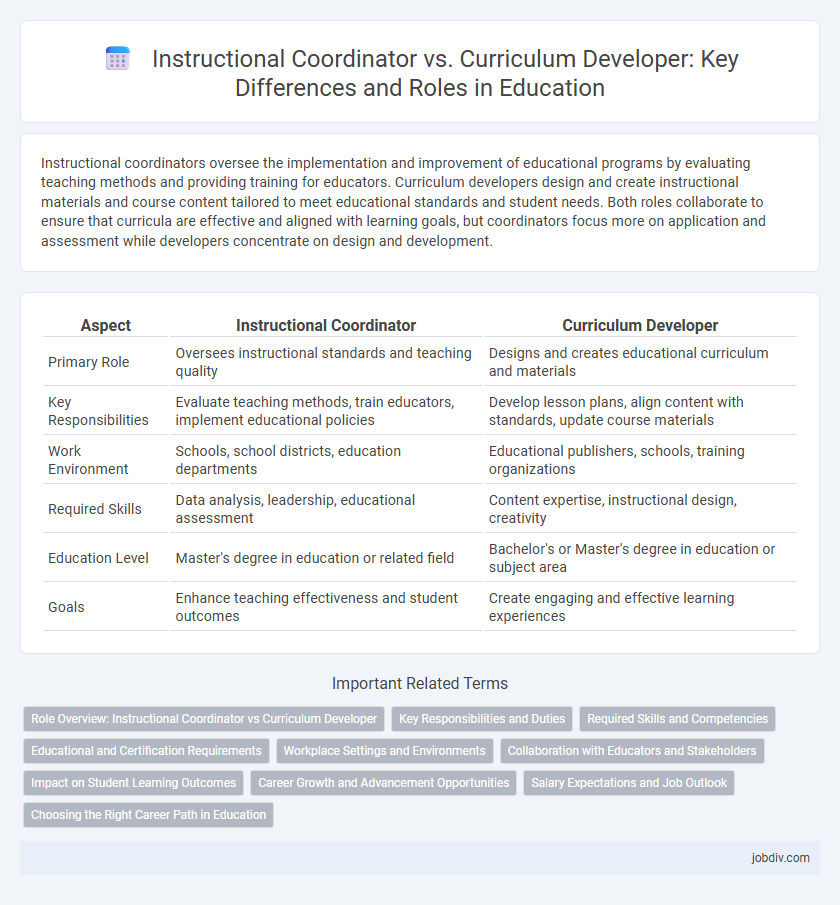Instructional coordinators oversee the implementation and improvement of educational programs by evaluating teaching methods and providing training for educators. Curriculum developers design and create instructional materials and course content tailored to meet educational standards and student needs. Both roles collaborate to ensure that curricula are effective and aligned with learning goals, but coordinators focus more on application and assessment while developers concentrate on design and development.
Table of Comparison
| Aspect | Instructional Coordinator | Curriculum Developer |
|---|---|---|
| Primary Role | Oversees instructional standards and teaching quality | Designs and creates educational curriculum and materials |
| Key Responsibilities | Evaluate teaching methods, train educators, implement educational policies | Develop lesson plans, align content with standards, update course materials |
| Work Environment | Schools, school districts, education departments | Educational publishers, schools, training organizations |
| Required Skills | Data analysis, leadership, educational assessment | Content expertise, instructional design, creativity |
| Education Level | Master's degree in education or related field | Bachelor's or Master's degree in education or subject area |
| Goals | Enhance teaching effectiveness and student outcomes | Create engaging and effective learning experiences |
Role Overview: Instructional Coordinator vs Curriculum Developer
Instructional Coordinators oversee the implementation and evaluation of educational programs, ensuring alignment with academic standards and teacher effectiveness. Curriculum Developers design and develop educational content, frameworks, and materials tailored to specific learning objectives and student needs. Both roles collaborate to enhance instructional quality but differ in their primary focus on program management versus resource creation.
Key Responsibilities and Duties
Instructional Coordinators analyze student performance data and implement educational standards to improve teaching effectiveness, focusing on training teachers and aligning instructional materials with state regulations. Curriculum Developers design and organize course content, develop lesson plans, and create educational resources to enhance learning outcomes across grade levels. Both roles require collaboration with educators and administrators to ensure curriculum quality and consistency within schools or districts.
Required Skills and Competencies
Instructional Coordinators require strong analytical skills, expertise in educational standards, and proficiency in data-driven decision-making to evaluate and improve teaching methods. Curriculum Developers must excel in creative content design, subject matter knowledge, and the ability to align instructional materials with learning objectives and standards. Both roles demand excellent communication, collaboration abilities, and understanding of educational technology to effectively support teachers and enhance student outcomes.
Educational and Certification Requirements
Instructional coordinators typically hold a master's degree in education or a related field and often require state certification or licensure in instructional design or administration. Curriculum developers may possess a bachelor's or master's degree in education, curriculum and instruction, or subject-specific areas, with certification less frequently mandated but advantageous for career advancement. Both roles benefit from experience in teaching and knowledge of educational standards, with instructional coordinators often needing experience in leadership or teacher training.
Workplace Settings and Environments
Instructional Coordinators typically work in K-12 school districts, higher education institutions, and government educational agencies, focusing on implementing educational standards and assessing teaching methods. Curriculum Developers often operate within publishing companies, educational technology firms, or corporate training environments, specializing in designing and producing instructional materials and learning modules. Both roles demand collaboration with educators and administrators, but Instructional Coordinators emphasize policy and system-wide improvements, while Curriculum Developers concentrate on content creation and resource development.
Collaboration with Educators and Stakeholders
Instructional Coordinators work closely with teachers, school administrators, and education specialists to implement effective teaching strategies and align instructional materials with state standards. Curriculum Developers collaborate with educators and stakeholders to design comprehensive, research-based curricula that address diverse student needs and promote academic achievement. Both roles emphasize ongoing communication, professional development, and feedback integration to enhance instructional quality and student outcomes.
Impact on Student Learning Outcomes
Instructional Coordinators analyze and implement teaching strategies that directly enhance student learning outcomes by aligning instructional methods with educational standards. Curriculum Developers design and refine academic content and materials, ensuring they meet diverse learner needs and promote critical thinking skills. Both roles collaborate to create cohesive educational experiences that improve student achievement and engagement across various subjects.
Career Growth and Advancement Opportunities
Instructional coordinators often experience career growth by moving into administrative roles such as director of curriculum or education program manager, leveraging their expertise in teacher training and instructional strategies. Curriculum developers advance by specializing in content design or educational technology, frequently transitioning into senior curriculum analyst or product development positions within educational publishing companies. Both career paths offer opportunities to influence educational standards and policies, with growth driven by proficiency in research, data analysis, and emerging pedagogical trends.
Salary Expectations and Job Outlook
Instructional Coordinators typically earn an average salary ranging from $60,000 to $80,000 annually, with a positive job outlook driven by increasing demand for improved educational standards. Curriculum Developers usually command salaries between $55,000 and $75,000, with growth projected due to ongoing curriculum modernization efforts and educational technology integration. Both roles offer stable career opportunities, but Instructional Coordinators often experience higher salary potential tied to administrative responsibilities and leadership in educational strategy.
Choosing the Right Career Path in Education
Instructional coordinators specialize in evaluating and improving teaching methods by developing training programs for educators, while curriculum developers focus on designing and updating educational content and lesson plans to meet academic standards. Career paths vary as instructional coordinators often require experience in teaching and leadership roles, whereas curriculum developers need strong skills in content creation and subject-matter expertise. Selecting the right career involves assessing your strengths in pedagogical strategy versus curriculum design, alongside your preference for working directly with educators or in content development.
Instructional Coordinator vs Curriculum Developer Infographic

 jobdiv.com
jobdiv.com